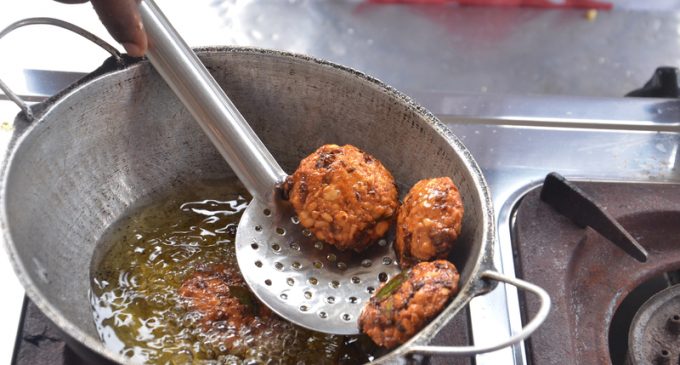
Reusing your frying oil can absolutely be done safety and without interfering with the flavor of food. Here's the right way to do it:
When you're finished frying…
First, clean the oil: Let it cool completely, then use a funnel to pour it through a fine mesh sieve into a resealable glass or plastic container (we like to use the same container the oil came in). This helps filter out any particles—bits and pieces from breading, for example—that may have contaminated the oil during the cooking process.Label the bottle “FRY OIL” so that you don't accidentally add it in your next batch of Vegan Chocolate Chip Cookies (it happened to me!).
Tightly seal and store in a cool, dark location. Some recommend storing fry oil in the fridge, while others say the back of the pantry.
The next time you're ready to fry, check for signs of degradation:
– foam on the surface,
– a fishy aroma or any scent that indicates it's “off” or rancid, or
– a dark, murky appearance.And if you try heating the oil and it smokes before it reaches the desired frying temperature, take it as another indication that it's no longer good to use. (Besides, if you can't bring the oil to the right temperature, your food is bound to be soggy or greasy.)
And if you're on the fence about reusing your frying oil, here's something to keep in mind:
Used oil can, for a time, be more efficient than fresh oil.
As oil breaks down, the molecules become less hydrophobic, which means they can come in closer contact with the food; thus, frying can happen more efficiently! (We learned this, too, from Kenji at Serious Eats This is why you'll hear that some people reserve old oil for mixing with new oil. At some point, however, used oil becomes so much less hydrophobic than in its original state that it enters the food too quickly, which leads to sog and grease.
Do you ever reuse your frying oil? What are some of your favorite tips and tricks for doing so? Share your thoughts in the comment section below!
Article Source: Food52


Interesting info thanks this is really great